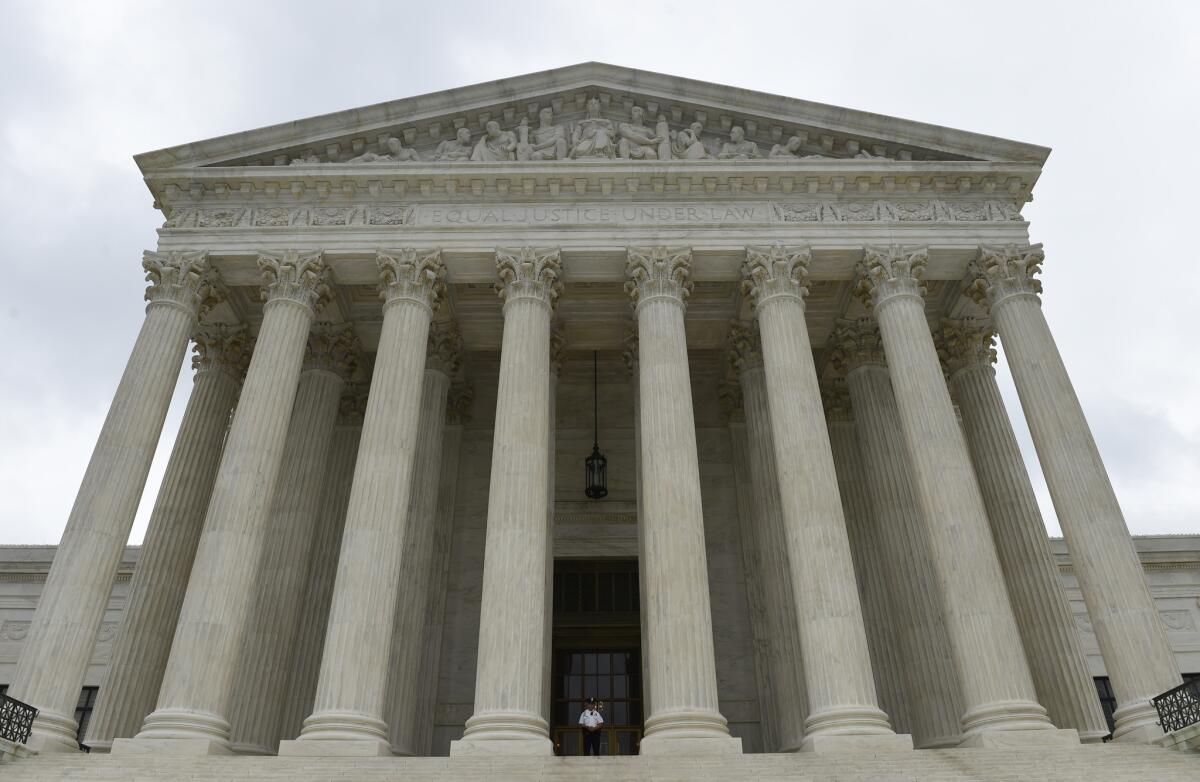Supreme Court asked to scale back landmark fair housing law

- Share via
Reporting from Washington — The Supreme Court signaled Wednesday it may be about to chip away at another 1960s-era civil rights law.
At issue is the Fair Housing Act of 1968, passed a week after Dr. Martin Luther King Jr.’s assassination. The law makes it illegal to refuse to rent or sell housing units based on race.
In the decades since Congress passed the landmark legislation, the government and most judges have concluded that it forbids not just blatant racial bias, but also sales or lending policies that have a discriminatory effect on blacks and Latinos, even when there is no proof of overt bias.
The Obama administration, for example, has aggressively used the law to sue banks and force large settlements for lending practices that left minorities paying higher rates or fees.
But the court’s conservatives have been skeptical of these so-called “disparate impact” claims. Twice before they have taken up challenges to bias claims that rely on such statistics, only to have the cases settled by civil rights advocates before a ruling.
After arguments Wednesday, the fate of this part of the Fair Housing Act looked to be in doubt.
Lawyers for a Texas government agency are contesting a claim from a Dallas fair housing group that accused the state of subsidizing low-income housing units in mostly black neighborhoods. This had the effect of “perpetuating racial segregation,” the suit alleged. The state should have subsidized housing units in mostly white neighborhoods, too, according to the suit.
During Wednesday’s argument, the justices made clear they did not want to decide the Texas suit, but instead would focus only on whether this type of claim was valid under the law.
The Texas lawyers said the state had not violated the Fair Housing Act because it had not singled out blacks or Latinos, or denied them housing.
The law is “limited to intentional discrimination,” argued Scott Keller, the Texas solicitor general.
Justice Ruth Bader Ginsburg objected. “There was a grand goal Congress had in mind. It meant to undo generations of rank discrimination,” she said. She said the lawmakers of 1968 wanted to break down segregated housing patterns across the nation.
U.S. Solicitor Gen. Donald Verrilli also defended the broad view of the law, arguing it was needed to combat discriminatory policies, some of them subtle, that preserve segregated housing.
Two years ago, the court’s conservatives, in 5-4 decision, cut back on the Voting Rights Act of 1965. Ruling in an Alabama case, they said Southern states and municipalities no longer needed to seek approval from Washington before changing their election rules. Civil rights champions said the decision greatly weakened the voting law.
Lawyers have disagreed on whether a ruling knocking out some housing bias claims would have a wide impact.
The outcome was also less certain because of Justice Antonin Scalia. During the argument, he repeatedly pressed the Texas lawyer to explain changes enacted by Congress in 1988. In an amendment to the Fair Housing Act, lawmakers said then that landlords could not be sued for refusing to rent to people who were convicted of drug crimes or who would exceed the “maximum number of occupants.”
Scalia said these carve-outs strongly suggest Congress thought discriminatory “impact” claims were otherwise valid. “We try to make sense of the law as a whole,” he told Keller.
But elsewhere during the hourlong argument, Scalia voiced his usual skepticism toward racial-bias claims.
The case heard Wednesday may be this term’s most important civil rights dispute, but it has also drawn wide interest in corporate America.
Lawyers for the banking and insurance industries warned the court that corporations could face huge legal claims if lenders or insurers can be held liable for using credit ratings or risk factors that have a harsher impact on blacks and Latinos compared to whites. They said companies had little choice but to settle claims brought by the government that trumpet statistical evidence of discrimination.
Justice Department lawyers countered that they need more than statistics to make a case.
Twitter: @DavidGSavage
More to Read
Sign up for Essential California
The most important California stories and recommendations in your inbox every morning.
You may occasionally receive promotional content from the Los Angeles Times.











